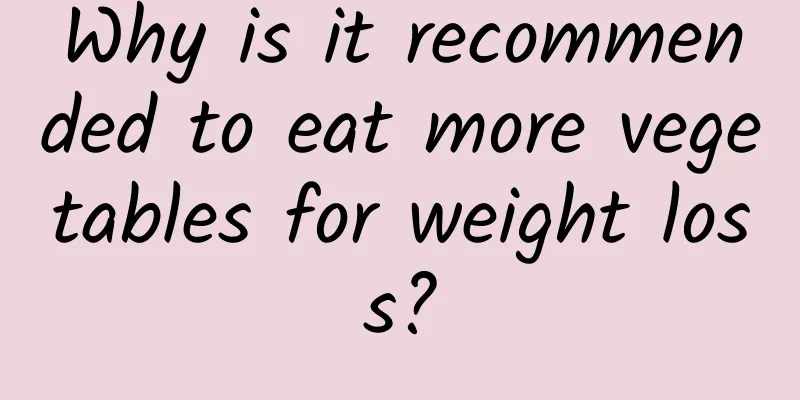Why is it recommended to eat more vegetables for weight loss?

|
Everyone has different reasons for gaining weight. Some people like to eat staple foods, while others like to eat meat. Some people have to attend social events every day, while others can't stop drinking milk tea. If you ask carefully, nine out of ten people have a common bad habit - eating too few vegetables. Therefore, experts suggest that you should eat more vegetables to lose weight. However, many people ask: Shouldn't you eat less to lose weight? Why should I eat more vegetables? Now listen to me slowly. Vegetables allow you to lose weight with dignity, without going hungry. There are all kinds of unreliable rumors that make people think that losing weight means going hungry, and they start to abuse themselves. In fact, there is no need to do so! During the weight loss period, the calorie intake is usually 300 to 500 calories less than the daily intake, and you must reduce the intake of staple foods, meat, eggs, fats, etc. But will you definitely not be full in this way? No, you can eat more vegetables! Most vegetables are very low in fat, protein and starch, and are typical low-calorie foods. Vegetables are also large in size, high in water content and rich in dietary fiber, which can fill the stomach. How much vegetables should you eat during weight loss? The recommended intake of vegetables in the Dietary Guidelines for Chinese Residents (2016 Edition) is 300 to 500 grams per day. Our suggestion is: as long as you don't get too full, the more the better (keep it light). Although eating too much of any food may lead to excess calories, the advantage of vegetables is that you really can't eat a lot... Even if you eat a few more bites, it's hard to exceed the calorie limit. Note: The vegetables mentioned here do not include potatoes, lotus roots, yams and other root vegetables with high starch content. During the weight loss period, these foods are all considered staple foods. Vegetables are not just fillers, they also have a lot of connotations. Many people think that obesity is "overnutrition". In fact, on the contrary, real fat people are usually in a state of multiple nutrient deficiencies, just "excess energy". In order to maintain health, including losing weight smoothly, the human body must first obtain comprehensive nutrition, including dozens of nutrients needed by the body. Otherwise, tissues and organs will not work properly, and the task of losing weight will be difficult to complete. For example, vitamins B1 and B2, which are often mentioned, can provide some coenzyme activity in energy metabolism. If they are lacking, the body's vitality will deteriorate, and it will even lose the ability to break down fat. For example, the synthesis process of thyroxine, a hormone that regulates metabolism, requires the cooperation of multiple nutrients such as iodine, selenium, and vitamin A derivatives, and none of them can be missing. This shows the importance of overall nutrition. Those who rely on dieting to lose weight may be effective at first, but long-term unbalanced diet is likely to lead to a lack of certain trace elements, causing abnormal metabolism. Apart from other things, the impact on thyroid function alone will reduce the basal metabolic rate, and eventually not only will you not be able to lose weight, but your health will also be affected. Therefore, you must take nutrition into consideration when losing weight. If you control your diet and increase exercise during your weight loss period, your body's need for nutrients will also increase. What foods should you eat to increase nutrition while limiting calories? Vegetables are another one to mention here! The importance of vegetables in the dietary structure is that they contain vitamin C, which is lacking in cereals, beans, and animal foods, as well as carotene, which can be converted into vitamin A in the body. In addition, vegetables contain various vitamins except vitamin D and vitamin B12, and their mineral content is also not inferior. They are an important source of minerals in the diet of Chinese residents. It is difficult for a person who does not eat vegetables or eats very little vegetables to achieve a balanced intake of nutrients. Many people will ask, these nutrients sound familiar, right? They are all in supplements, right? Isn't it more convenient to just buy supplements? Don't rush to place an order, there is a third reason why you can't refuse vegetables. Vegetables can fight inflammation in the body and improve the quality of life. Obesity is not just about having more fat on the body. It has long been classified as a disease because obesity has many health hazards: it can cause metabolic disorders (nutrients, hormones, adipose cytokines, etc. metabolic disorders, oxidative stress and increased levels of low-grade chronic inflammation), which in turn increases the risk of various chronic diseases. Therefore, weight loss should not only focus on reducing body weight and body fat, but also pay attention to correcting metabolic disorders. There is early evidence that increasing vegetable intake can reduce the risk of cardiovascular and cerebrovascular diseases and mortality, reduce the risk of some cancers (esophageal cancer, colon cancer, liver cancer, nasopharyngeal cancer), and reduce all-cause mortality. For example, cruciferous vegetables, represented by broccoli, are associated with a reduced risk of certain diseases and cancers, such as diabetes, breast cancer, prostate cancer, colorectal cancer, bladder cancer, etc. Eating more green leafy vegetables can also help prevent cognitive decline. Studies have shown that people who eat more vegetables every day have slower cognitive decline than those who eat less or no vegetables. This may be due to the various natural health ingredients in vegetables, such as flavonoids, organic sulfides, lutein, folic acid, etc. Each of these various phytochemicals may affect certain behaviors of the body. Of course, there are some phytochemical supplements on the market, but first of all, we can't eat all the ingredients from the supplements, and a bottle of a single ingredient supplement costs at least hundreds of yuan, and it may not be effective (a lot of evidence shows that plant extracts have no effect in preventing diseases), while a handful of green vegetables costs only a few dollars, which already contains tens of millions of natural phytochemicals in appropriate proportions, and there is also solid evidence of health benefits. After reading this, if you still decide not to eat vegetables, it seems that the conclusion of the above research has been verified - if you eat too few vegetables, your cognitive decline will be a bit faster. Finally, here are some suggestions for eating vegetables, from the Dietary Guidelines for Chinese Residents (2016 Edition): Color can be used as one of the indicators of the richness of nutrients and phytochemicals in fruits and vegetables. Dark vegetables refer to dark green, red, orange-red, and purple-red vegetables, which have more nutritional advantages and should be consumed with special attention. You should ensure that you consume 300 to 500 grams of vegetables every day, of which dark vegetables should account for at least half, and make sure that you have vegetables at every meal. |
<<: Medication dosage: Elderly people are not equivalent to adults
Recommend
Is it possible to be pregnant if the ovulation test paper shows a weak positive result on the ninth day of ovulation?
I believe that many women who are in the stage of...
What causes renal cysts in women?
Women are more likely to get kidney cysts. If the...
Does the shrimp contain high iodine? How to keep the shrimp fresh?
Prawns contain many nutrients, such as protein, f...
Is it still possible to have children after menopause?
When women reach a certain age, such as around 50...
I don't feel any water when having sex with my husband
In life, many women find that their lower body is...
How long does it take for the lochia to be clean after abortion?
Abortion itself causes considerable harm to the f...
How can I have miscarriage within one month of pregnancy?
Many women do not prepare themselves for motherho...
What does non-gonococcal vaginitis mean?
We still need to be vigilant in the face of vario...
The T-zone of the pregnancy test stick is very light and almost transparent
Many girls don’t know how to use the pregnancy te...
How can I lose weight after giving birth? Why do I gain a lot of weight after giving birth?
Some people gain weight after giving birth, while...
What type of anterior uterine fibroids are
Uterine fibroids on the anterior uterine wall are...
How long does it take for twins to be born?
The full-term time for twins is 37 weeks. At this...
How come I got pregnant after taking birth control pills?
Under normal circumstances, people usually choose...
Tencent: WeChat and WeChat monthly active users reached 1.313 billion in Q4 2022, up 3.5% year-on-year
Recently in the afternoon, Tencent Holdings relea...
What are the surgeries for endometriosis?
As a common gynecological disease, endometriosis ...









